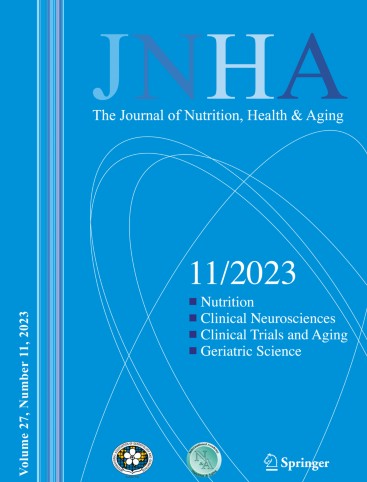Multi-trajectories of intrinsic capacity and their effect on higher-level functional capacity, life satisfaction, and self-esteem in community-dwelling older adults: the NILS-LSA
IF 4.3
3区 医学
Q1 GERIATRICS & GERONTOLOGY
引用次数: 0
Abstract
Objectives
Variability in intrinsic capacity (IC) changes among community-dwelling older adults and their effect on health outcomes remain understudied. We examined the variability in IC trajectories and their impact on higher-level functional capacity (HLFC), life satisfaction, and self-esteem.
Design
Longitudinal study.
Setting
Data from the second to seventh waves (2000–2012) of the National Institute for Longevity Sciences–Longitudinal Study of Aging project.
Participants
934 community dwellers (aged ≥60).
Measurements
We used group-based multi-trajectory modeling to obtain IC trajectories across six domains: cognition, locomotion, vitality, vision, hearing, and psychological well-being. We employed multivariable regression to investigate the associations between IC trajectories and a decline in HLFC (assessed using the Tokyo Metropolitan Institute of Gerontology Index of Competence [TMIG-IC]; baseline TMIG-IC - follow-up TMIG-IC ≥ 2; logistic regression model), life satisfaction (assessed using the Life Satisfaction Index-K [LSI-K]; linear mixed model), and self-esteem (assessed using the Rosenberg Self-Esteem Scale [RSES]; linear mixed model).
Results
We identified four IC trajectories: the “healthy aging group” (63.7%), the “hearing decline group” (15.1%), the “vision and cognitive decline group” (12.7%), and the “comprehensive deterioration group” (8.5%). Compared to the healthy aging group, the vision and cognitive decline group and the comprehensive deterioration group displayed a significantly greater risk of a decline in the TMIG-IC score (multivariable-adjusted odds ratio [aOR], 95% confidence interval [CI] = 2.05 [1.11, 3.79], 2.74 [1.41, 5.30], respectively), the LSI-K score (multivariable-adjusted β [standard error] = −0.46 [0.08], −0.52 [0.10], respectively), and the RSES score (multivariable-adjusted β [standard error] = −0.85 [0.16], −0.66 [0.20], respectively). The “hearing decline group” did not show a significantly increased risk for these outcomes.
Conclusion
Older adults with different IC trajectories may differ in HLFC, life satisfaction, and self-esteem. Public health officials should be aware of this and provide targeted interventions.
社区老年人内在能力的多轨迹及其对高级功能能力、生活满意度和自尊的影响:NILS-LSA
目的:社区老年人内在能力(IC)变化的变异性及其对健康结果的影响仍未得到充分研究。我们研究了IC轨迹的可变性及其对高层次功能能力(HLFC)、生活满意度和自尊的影响。DesignLongitudinal研究。国家长寿科学研究所老龄化纵向研究项目第二至第七波(2000-2012)数据。参与者934名社区居民(年龄≥60岁)。我们使用基于群体的多轨迹建模来获得六个领域的IC轨迹:认知、运动、活力、视觉、听觉和心理健康。我们采用多变量回归研究IC轨迹与HLFC下降之间的关系(使用东京都老年学研究所能力指数[TMIG-IC]进行评估;基线TMIG-IC -随访TMIG-IC≥2;logistic回归模型)、生活满意度(使用生活满意度指数- k [LSI-K]评估;线性混合模型)和自尊(使用Rosenberg自尊量表[RSES]进行评估;线性混合模型)。结果识别出“健康衰老组”(63.7%)、“听力下降组”(15.1%)、“视力和认知能力下降组”(12.7%)和“综合恶化组”(8.5%)4种IC轨迹。与健康衰老组相比,视力和认知能力下降组和综合恶化组在TMIG-IC评分(多变量调整优势比[aOR], 95%可信区间[CI]分别= 2.05[1.11,3.79],2.74[1.41,5.30])、LSI-K评分(多变量调整β[标准误差]= - 0.46[0.08],- 0.52[0.10])和RSES评分(多变量调整β[标准误差]= - 0.85 [0.16],−0.66[0.20])。“听力下降组”没有显示出这些结果的显著增加的风险。结论不同IC轨迹的老年人在HLFC、生活满意度和自尊方面存在差异。公共卫生官员应该意识到这一点,并提供有针对性的干预措施。
本文章由计算机程序翻译,如有差异,请以英文原文为准。
求助全文
约1分钟内获得全文
求助全文
来源期刊
CiteScore
7.80
自引率
3.40%
发文量
136
审稿时长
4-8 weeks
期刊介绍:
There is increasing scientific and clinical interest in the interactions of nutrition and health as part of the aging process. This interest is due to the important role that nutrition plays throughout the life span. This role affects the growth and development of the body during childhood, affects the risk of acute and chronic diseases, the maintenance of physiological processes and the biological process of aging. A major aim of "The Journal of Nutrition, Health & Aging" is to contribute to the improvement of knowledge regarding the relationships between nutrition and the aging process from birth to old age.

 求助内容:
求助内容: 应助结果提醒方式:
应助结果提醒方式:


